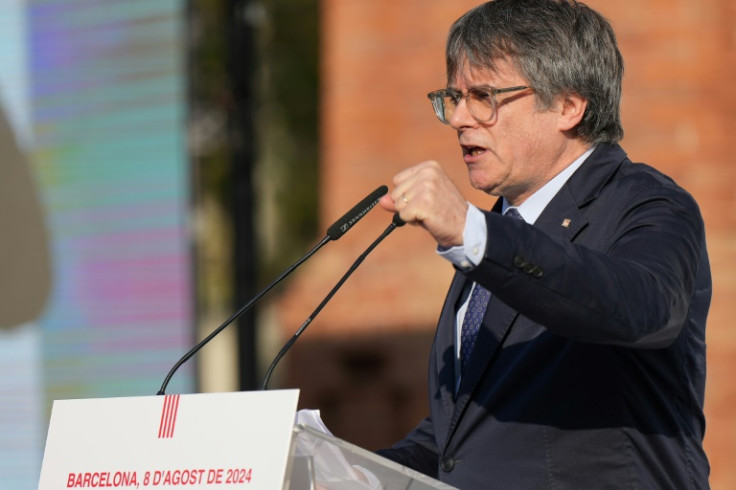
A top Spanish judge demanded explanations on Friday from police and government as to how fugitive Catalan leader Carles Puigdemont was able to return to Spain despite a pending arrest warrant and vanish again.
Supreme Court Judge Pablo Llarena, who had issued the arrest warrant for Puigdemont, requested answers specifically from Catalonia's regional police force, the Mossos d'Esquadra.
Puigdemont, who fled abroad after leading a failed 2017 independence bid for Catalonia, defied the warrant to return to Spain on Thursday and delivered a speech to thousands gathered at the Catalan regional parliament in Barcelona before escaping.
He had been expected to try to enter the parliament building for the investiture vote to pick a new leader for the wealthy northeastern region but instead disappeared into the crowd.
Catalonia's regional police said it had arrested two officers, including one who owned the car used by Puigdemont to leave the scene.
The force, which has launched a manhunt for 61-year-old Puigdemont, denied there had been any collusion and insisted officers had planned to arrest him "at the most opportune time so as not to generate public disorder".
Puigdemont "took advantage of the numbers of people around him and fled the scene in a vehicle that the Mossos tried to stop but failed" the force said on Thursday.
Judge Llarena also asked the interior ministry for details of its plan to arrest him at the border as well as "the orders that were issued" to capture Puigdemont "after his escape".
The judge sought the names of "the agents responsible for the design of the operation, those responsible for its approval and those who have been entrusted with its execution or operational deployment".
Puigdemont's lawyer, Gonzalo Boye, told Catalan radio on Friday that his client had fled abroad again, without giving details.
The secretary general of Puigdemont's hardline JxCAT party Jordi Turull said "he is going back to Waterloo", the Belgian city where he spent most of the seven years he has been in self-imposed exile.
Puigdemont led the regional government in 2017, when it pushed ahead with an independence referendum despite a court ban, followed by a short-lived declaration of independence.
He fled Spain shortly after the failed independence bid to avoid prosecution and has since lived in Belgium and more recently France.
Spain's parliament passed an amnesty law in May for those involved in the secession bid, but the Supreme Court ruled on July 1 that the measure would not fully apply to Puigdemont.
Turull said Puigdemont had not planned to return to Catalonia and then escape but changed his plans when he saw the massive security presence.
It was not foreseen "that there would be a police deployment that we have not seen in Catalonia for the biggest criminal, terrorist, drug trafficker," Turull told Catalan radio.
"The first scenario was that he could return to benefit.. from the amnesty law," he added.
The leader of the main opposition Popular Party, Alberto Nunez Feijoo, has called Puigdemont's return to Spain an "unbearable humiliation" that damaged the country's image.
Spanish Justice Minister Felix Bolanos said on Friday the operation to arrest Puigdemont "was the responsibility of the Mossos", whose job it was to enforce court orders in Catalonia.
"In Spain the law must be respected and court orders must be complied with," the minister said.
Catalonia's parliament on Thursday elected Salvador Illa of Spanish Prime Minister Pedro Sanchez's Socialists as Catalonia's first head not from the pro-independence movement since 2010.







